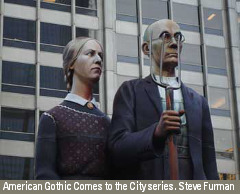Uncertainty vs. Renewed Confidence in the Word of God, Part 2
(Read Part 1)
Where to from Here?
As a result of these past and present influences, the church of Christ is facing an authority crisis. There has been a steady erosion of confidence in Scripture for several decades cumulating in theological and/or practical elimination of the need for the Bible in our lives. After all, in a society infatuated with success—theological understanding, biblical knowledge and even righteous living are no match for fancy buildings, high-powered programs, the finest in entertainment and emotional experiences (no matter what the source).
Very few churches grow numerically today because of solid teaching of the Word. That is because very few Christians today see the importance of the Word. To them the Bible is much like a musical concert, there to produce an experience, not to transform their lives. They see no vital connection between Scripture and life. To know God’s truth is not essential to how they want to live their lives, therefore they have no desire to study the Bible.
Discussion
The Gospel Coalition's Accommodation to Postmodernism in their Statements on Inerrancy
Body
“[T]he TGCstatements on the face appear evangelical but the nuanced language can have more than one meaning.”
Discussion
Postmodernism 7 - The Postmodern Church
From Sunesis. Posted with permission. Read the series.
The quotation below is from www.vintagefaith.com. (This site is currently down, with a promise that it will be revised and restarted January 1, 2013—yes, that’s the correct date; even the postmoderns struggle with maintaining relevance.)
There is a rising feeling among emerging church leaders and followers of Jesus, that in many modern contemporary churches, something has subtly gone astray in what we call “church” and what we call “Christianity.” Through time, church has become a place that you go to have your needs met, instead of being a called local community of God on a mission together. Through time, much of contemporary Christianity subtly has become more about inviting others into the subcultures of Christian music, language and church programs than about passionately inviting others into a radically alternative community and way of life as disciples of Jesus and Kingdom living. Sadly, we are now seeing the results of this. While many of us have been inside our church offices busy preparing our sermons and keeping on a fast-paced schedule in the ministries and internal affairs of our churches, something alarming is happening on the outside. A great transformation is happening in our own neighborhoods, schools, and colleges. What once was a Christian nation with a Judeo-Christian worldview, is fast becoming an unchurched post-Christian nation. Tom Clegg and Warren Bird in their book Lost In America claim that the unchurched population of the United States is now the largest mission field in the English-speaking world and fifth largest globally. There are many great churches ministering to modern-minded people, but we must be also be passionate about emerging generations who aren’t connecting with current forms of ministry and thinking. Yet, there are some exciting things developing and stirring. So many people are beginning to experience the same sort of unsettledness and beginning many positive and healthy conversations. More and more emerging leaders are re-seeking the Scriptures, studying the early church and church history and rethinking a lot of what we are doing. In our desire to engage the current culture and emerging generations, perhaps we need to spend time looking more to the values and ancient roots of our faith, instead of looking out primarily for what is “cutting edge,” the next “model” or the latest programs. Vintage Faith is simply looking at what was vintage Christianity. Going back to the beginning and looking at the teachings of Jesus with fresh eyes and hearts and minds. Carefully discerning what it is in our contemporary churches and ministry that perhaps has been shaped through modernity and evangelical subculture, rather than the actual teachings of Jesus and the Scriptures. We need to begin asking a lot of questions again. We shouldn’t be afraid to ask questions. Too much is at stake not to.
Discussion
Postmodernism 6 - Politics
From Sunesis. Posted with permission. Read the series.
Recent events of national importance prompt us to reflect on postmodern politics. While postmodern thinking has been around for a number of years, we have now in the White House America’s first postmodern president.
Discussion
Postmodernism 5 - Society
 Posted with permission from Sunesis. Read the series.
Posted with permission from Sunesis. Read the series.
How does a postmodern mindset affect the way we live? Its effects upon art, literature, and architecture are, to a great extent, merely “interesting.” We can ignore the postmodernism in these areas without it affecting how we live. When postmodernism changes the society in which we live, however, we take notice.
There is a great interest in multiculturalism in the postmodern mindset. An American family drives their Japanese car to a Mexican restaurant, returns to their English Tudor house, watches a western on TV and listens to African music on their Chinese stereo system. By doing so, they believe that they are experiencing a variety of “cultures.” We believe that we live in a global smorgasbord. However, is eating a burrito at Taco Bell really a Mexican experience? Does driving a Japanese car give me any cultural understanding of Japan? Are we truly multicultural, or do we simply skim the surface of other cultures like a tourist on a ten-day tour of Africa?
Modernism emphasized unity. Society was homogenized. Immigrants to America became Americans, without an attached prefix. National chains replaced home-grown businesses (the McWorlding of society). Malls and office buildings all took on the same look. For most of the 20th century, there were three television networks and they were pretty much the same.
Discussion
Postmodernism 4 - Art

Art brings philosophy down to earth. While this writer is not artistic, he does understand to a limited extent the philosophy of art. Modern artists believe in several concepts. First, modern artists believe in the uniqueness of the artist. The artist is the creator. Because of the emphasis on the individual, the modern artists are highly trained and elitist; there are only a small number of true artists. Second, modern artists believe in the integrity of the art itself. The product of the artist is singular, a unique product different from all other art works. Modern art is absolutist—pure form and disembodied beauty. Art exists for the sake of the product. Third, the art of the modern artist is a vision of truth. There is some connection between the art and the world around us. It may not look like truth to the viewer, but the artist himself had some intention of linking his art to the world.
Because artists tend to be countercultural, not every current artist is postmodern in his or her philosophy. Some artists today have reacted against modern art by using past styles and going back to human values, but postmodern art is distinctively different. First, postmodernism plays with art. There is no longer a distinction between what is artistic and what is not. Second, postmodern art is not individual. The postmodern artist is not concerned about himself, but focuses on the viewers’ reactions. Third, postmodern art rejects any concept of truthfulness. It makes no necessary connection to reality. It seeks for disunity. There is no truth; everything is fiction. Since postmodernism rejects any moral absolutes, art becomes political, not moral or philosophical.
Discussion
Postmodernism 3 - Characteristics
From Sunesis. Posted with permission. Read the series.




Discussion